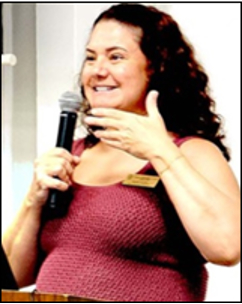
- This event has passed.
Angela Cancellara – Alzheimer Society Niagara Region

Angela Cancellara – Alzheimer Society Niagara Region. Programs to help those with dementia
Angela Cancellara clears the mystery around aging and dementia
Herb Woods introduced guest speaker, Angela Cancellara, Public Education Coordinator, Alzheimer Society of Niagara Region whose presentation is on dementia and programs available to help those with the disease. She pointed out that the number of people living with dementia in Canada is increasing and the Alzheimer Society is a very valuable part of our community.
Angela has a degree in Community Health and her role at the Alzheimer Society has provided her with the opportunity to educate and support care partners and people living with dementia.
 Angela discussed how our brain works, and the oxygen/nutrients required for its maintenance. She used the simple act of answering a telephone to show how the brain uses perception, decision making, motor skills and social skills for such basic everyday tasks. She described how our brain changes as we age and gave several examples of normal aging and not normal aging such as social engagement and not remembering names and faces.
Angela discussed how our brain works, and the oxygen/nutrients required for its maintenance. She used the simple act of answering a telephone to show how the brain uses perception, decision making, motor skills and social skills for such basic everyday tasks. She described how our brain changes as we age and gave several examples of normal aging and not normal aging such as social engagement and not remembering names and faces.
Normal aging, Mild Cognitive Impairment (MCI), and dementia are cognitive states encountered in older adults. She said that 40% of people over 65 experience some form of memory loss with no cognitive loss; MCI has cognitive loss but no impairment of daily living; dementia shows cognitive loss with impairment of activities of daily living. Angela pointed out that dementia is not just an old person’s disease as there are limited cases of young onset dementia.
Dementia is an overall term for a set of symptoms that are caused by disorders affecting the brain. These include Alzheimer’s Disease (60-80%), Vascular Dementia (15-25%), Lewy Body Dementia (5-10%), Frontotemportal Dementia (5-10%), Huntington’s Dementia and Parkinson’s Dementia among others.
Angela pointed out that there are unavoidable risk factors such as age, gender (women are more likely to suffer dementia than men) and genetics.
She said that early diagnosis is important as some causes are reversible such as elevated cholesterol, thyroid problems, diabetes and medications. Angela urged people to make healthy choices by choosing nutrient-dense foods, giving your brain challenges and increasing physical activity. Most important is to stay socially engaged and manage stress by finding pockets of joy every day.
There is hope for the future. Angela said that 40% of cases could be prevented and many more delayed through awareness and lifestyles.
Duncan McLaren thanked Angela for helping us understand dementia and how we can help ourselves and others. The message was timely as evidenced by the numerous detailed questions.
